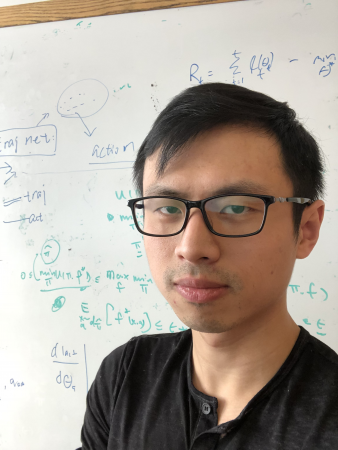Faculty Candidate
Faculty Candidate Talk: Computational Design for the Next Manufacturing Revolution
Areas of interest: Computational design for manufacturing Abstract: Over the next few decades, we are going to transition to a new economy where highly complex, customizable products are manufactured on demand by flexible robotic systems. In many fields, this shift has already begun. 3D printers are revolutionizing production of metal parts in the aerospace, automotive, [...]
Faculty Candidate Talk: Visual Perception and Navigation in 3D Scenes
Abstract: In recent times, computer vision has made great leaps towards 2D understanding of sparse visual snapshots of the world. This is insufficient for robots that need to exist and act in the 3D world around them based on a continuous stream of multi-modal inputs. In this talk, I will present some of my efforts in bridging this gap between computer vision and robotics. I will show [...]
Faculty Candidate: Probing Light Transport for 3D Shape
Abstract: There is a rising demand for high-performance 3D sensors in response to the rapid development of autonomous cars, 3D printers, and virtual/augmented reality systems. These sensors often make use of controllable light sources to send light signals into an environment, and cameras to measure the signal reflected back in response. This approach can, however, fail [...]
Carnegie Mellon University
Social Signal Processing: A Computational Approach to Sensing, Reconstructing and Understanding Social Interaction
Abstract: Humans convey their thoughts, emotions, and intentions through a concert of social displays: voice, facial expressions, hand gestures, and body posture. Despite advances in machine perception technology, machines are unable to discern the subtle and momentary nuances that carry so much of the information and context of human communication. The encoding of conveyed information [...]
Faculty Candidate: Petter Nilsson
Areas of Interest: Improving design practices and advancing the capabilities of autonomous systems Host: Stephen Smith Admin Contact: Keyla Cook keylac@andrew.cmu.edu
Multimodal Computational Behavior Understanding
Emotions influence our lives. Observational methods of measuring affective behavior have yielded critical insights, but a persistent barrier to their wide application is that they are labor-intensive to learn and to use. An automated system that can quantify and synthesize human affective behavior in real-world environments would be a transformational tool for research and for [...]
Faster, Safer, Smaller: The future of autonomy needs all three
Abstract In this talk I will start with state estimation as my PhD work. Very often, state estimation plays a crucial role in a robotic system serving as a building block for autonomy. Challenges are to carry out state estimation in 6-DOF, in real-time at high frequencies, with high precision, robust to aggressive motion and [...]
Automatic Human Behavior Analysis and Recognition for Research and Clinical Use
Nonverbal behavior is multimodal and interpersonal. In several studies, I addressed the dynamics of facial expression and head movement for emotion communication, social interaction, and clinical applications. By modeling multimodal and interpersonal communication my work seeks to inform affective computing and behavioral health informatics. In this talk, I will address some of my recent work [...]
Service Robots for All
Robots have the unique potential to help people, especially people with disabilities, in their daily lives. However, providing continuous physical and social support in human environments requires new algorithmic approaches that are fast, adaptable, robust to real-world noise, and can handle unconstrained behavior from diverse users. This talk will describe my work developing and studying [...]
Carnegie Mellon University
Towards Generalization and Efficiency in Reinforcement Learning
Abstract: In classic supervised machine learning, a learning agent behaves as a passive observer: it receives examples from some external environment which it has no control over and then makes predictions. Reinforcement Learning (RL), on the other hand, is fundamentally interactive : an autonomous agent must learn how to behave in an unknown and possibly [...]









